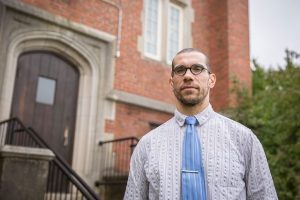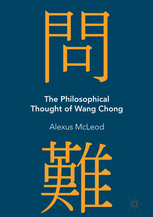 An interview conducted by Jason O. Chang, Director of the Asian and Asian American Studies Institute, with Alexus McLeod, a Professor at the University of Connecticut and a Core Faculty member of the Asian and Asian American Studies Institute, on Alexus’ book, The Philosophical Thought of Wang Chong.
An interview conducted by Jason O. Chang, Director of the Asian and Asian American Studies Institute, with Alexus McLeod, a Professor at the University of Connecticut and a Core Faculty member of the Asian and Asian American Studies Institute, on Alexus’ book, The Philosophical Thought of Wang Chong.
Chang: Hi Alexus, Your new considers the philosophy of a Chinese thinker in the first century. How did you come to focus on Wang Chong’s philosophy and what did you find compelling about this philosopher? Also, what type of work was involved in this book? I imagine that you had the work of translating the original texts but then also drawing from your other training in comparative philosophy.
MacLeod: I actually started working on Wang Chong about 20 years ago as an undergraduate in philosophy. He was one of the first early Chinese philosophers who caught my interest. I was studying Chinese language and Philosophy at the time, and one of my teachers in Chinese introduced me to the thought of Wang Chong in a course on Classical Chinese Culture and Thought. Right away I became interested in the similarities between Wang’s ideas and those of Western philosophers whose work I was studying in the Philosophy Department, which was striking. Particularly, Wang’s philosophical method is very close to that of early Greek philosophers such as Plato. Wang adopted what he called a method of “questioning and challenging” (問難wen nan), through which he thought we could discover truth (these are also the two Chinese characters on the cover of the book!). Through graduate school, I occasionally came back to the topic of Wang Chong’s Lunheng, and considered working on a translation of the text. I conceived of the idea of the book, a study of the philosophical aspects of Wang Chong’s thought, back then during graduate school. Over the coming years, I worked on the project off and on as other things got in the way (a dissertation and five books since then!), but last year I finally decided to return to this project and finish it once and for all. I translated about 1/4th of the Lunheng (an enormous text), which I planned to include as an appendix in this book. Unfortunately, the hard drive of my computer was catastrophically damaged earlier this year, and I lost almost my entire translation. A couple of chapters survived, and those made it into the book. Most of the book is a study of Wang Chong’s thought, the historical background, connections between the views and arguments he develops and those of his contemporaries, and discussion of the ways Wang’s views and arguments can contribute to current debates on the topics on which he wrote, such as truth, knowledge, and human agency.
Chang: It is so tragic to lose work like that, I can relate but not to that extent. Dang. Well, moving on, can you describe one of your favorite parts of Chong’s philosophical thought. Also do think students might see its relevance today?
MacLeod: There’s a lot to like about Wang Chong’s thought. In addition to being a rigorous and innovative thinker who devised unique views on many of the central philosophical issues discussed in his time, he also dealt with history, science, and a wide variety of areas. Probably my favorite section of the Lunheng, which is the single extant text associated with Wang Chong and a kind of compilation of his works, is his discussion of his philosophical method and its usefulness. In a chapter discussing various teachings of the famous philosopher Confucius (already a revered ancient sage by the time Wang lived and wrote in the 1st century CE), Wang develops his method of “questioning and challenging”. He argues that without questioning and challenging the claims of others, we are prone to being duped by false claims that play on our natural biases, such as our tendency to be swayed by “flowery language” or to believe in positions that flatter us or claim that the world is the way we would like it to be. If we don’t question and challenge the claims others present to us as true, we will be manipulated into believing false things. And those who would manipulate us thus do not have our interests in mind, but rather their own. By getting us to accept certain falsehoods, they make us more likely to act in ways that benefit them, even when they cut against our own interests (as falsehoods almost always do). This is a timeless message, and certainly has a renewed importance in today’s world, in which the kinds of manipulation and acceptance of falsehood Wang discusses has become so common that it leads many people to question whether truth even matters or whether there is such a thing as truth.
Chang: That is such a great point. Now that you’ve finished this book, what’s on the horizon for your research agenda?
MacLeod: I’ve got a bunch of different things in the works right now (probably too many!). In addition to a number of other projects, I’m working on three books and a translation. One of the books is a co-authored volume (with Joshua Brown, a theologian at Mount St. Mary’s University and former student of mine at the University of Dayton) on transcendence and substance in Early China. Another book is a study of differing views on the meaning and significance of madness (kuang) for personhood in early Confucianism and Daoism. I’m also working on a complete translation of the Kongzi Jiayu (School Sayings of Confucius), an important Han Dynasty Confucian text, with Brian Bruya (Philosophy, Eastern Michigan University). Finally, I’m working on a book on a subject a bit distant from my main academic area of specialization—a biography of former US President and Chief Justice of the US William Howard Taft.
Chang: Thank you for taking the time to discuss your work. Good luck on the new work ahead of you.
To read more about Alexus’ book, click here.